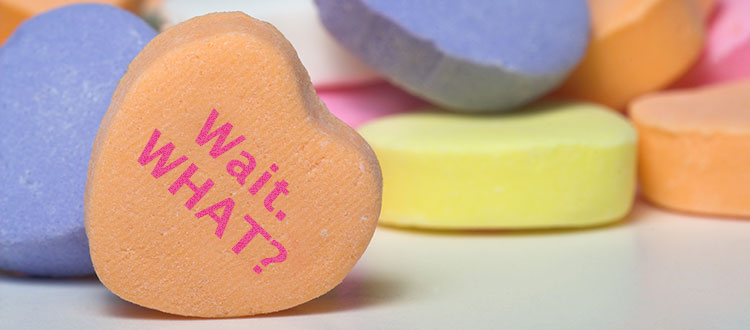A Lover’s Guide to a Non-Toxic Valentine’s Day
 |
| Robyn Hegland Windham Director of Development |
Aww, Valentine’s Day. A day for romance, wining and dining, cuddling, chocolate, lovemaking, and of course, showing your affection by showering yourself and your beloved with toxic chemicals. (Wait, what?)
Hey, I’m not here to ruin your fun. Valentine’s Day is alright in my book, but some of these in-the-mood Valentine’s Day go-tos can be questionable when it comes to women’s health.
Fragranced Body Products and Candles
You’ve got your bedroom on lock—candles burning, massage oil and lotion on hand. A+ for wanting to give your partner the full experience, but let’s have a chit chat about all that fragrance. That wonderful smell is likely made up of a combination of hundreds of synthetic chemicals, some of which have been linked to health impacts ranging from eye and skin irritation to hormone imbalance and increased risk of breast cancer. But you wouldn’t know it, because these ingredients are kept secret—most manufacturers don’t disclose fragrance ingredients, and most use chemicals that haven’t been screened for safety.
We do know how fragrance can stick around—and while it can be romantic and comforting to pick up an article or your boo’s clothing and get a whiff of their signature scent, those same chemicals that make fragrance stick to clothing also make it stick to and build up in your body, disrupting your hormones and increasing your risk of health problems.
Fragrance isn’t sounding so sexy anymore, is it? The good news is—it’s not necessary. After all, aren’t we wired to love our partner’s natural scent? When prepping for V-Day, look for unscented candles, and fragrance-free lotion and body oil (or try using coconut or almond oil for that massage). To make your home smell nice, get crafty and create a natural room scent with herbs and citrus, or score extra lover points by baking some cookies (send some to us at 114 W. Pine St. Missoula, MT 59802, please).
Lubricants and Condoms
Of course, Valentine’s Day is a great time to spice things up in the bedroom, but when it comes to lube and condoms—keep it simple. Irritants and allergens are often found in personal lubricants and condoms, especially those that offer added features like flavor/fragrance, ‘warming’ or ‘tingling’ — these terms mean added chemicals, many of which are no good for your parts. Look for simple, water-based lubricants free of parabens, petrochemicals and glycerin, and pay close attention to your reaction to use.
Sex Toys
Unfortunately, lots of harmful chemicals are present in products intended for adult between-the-sheets fun, and the regulation of said toys is a great deal like the regulation of the cleaning product, cosmetic and menstrual care product industries—poor, with little research and plenty of loopholes. For example, though sex toys are meant to be used internally (or on super absorptive areas), they are often labeled ‘for external use only,’ or, ‘for novelty use only’ to avoid regulation by the FDA. Sex toys can contain chemicals like phthalates, cadmium and toluene, which have been linked to endocrine disruption, reproductive problems and cancer. Some users of toxic toys experience reactions right away, like severe burning and itching (well, that could sure kill the mood), while all risk potential long-term effects.
Good toys abound—look for toys made of 100 percent silicone, and be sure—some companies might label their toys as silicone when they in fact contain other types of plastic which are more likely to contain toxic additives. Materials like glass, metal, wood and ceramic can also be safe and sterile options. There are some awesome, trustworthy manufacturers, retailers and educators who are ‘committed to a safer, sexier adult toy market,’ and we love this very informative list from badvibes.org.
Pre- and Post-Play Wipes and Washes
Wipes and washes are increasing in popularity, marketed to women as a must-have for their health and self-esteem. Absurd messaging tells women that their vagina is dirty and in need of cleansing, and that it should smell like a flower or an island breeze. I’m here to tell you that it’s 100% okay that your vagina smells like a vagina. Don’t let anyone make you feel like your natural scent is unacceptable—whether it’s corporate marketing or your partner.
These products aren’t just offensive, but toxic—with questionable, undisclosed ingredients that can disrupt your hormones, increase your risk of breast cancer and cause allergic reactions and infections. Yes—infections. The very products which women use to remedy odor might in fact cause more odor. Cleansing can have a cyclical affect—woman has vaginal infection, uses product to remedy odor, gets worse infection, uses more product to remedy odor, infection intensifies…you get the jist. If you do have an odor that is bothering you, it might be time to visit your OB GYN, instead of the “feminine cleansing” aisle.
To freshen up pre- or post-sex, go with the best non-toxic cleanser of all—water. Use a wet washcloth or toilet paper to cleanse. Or, get sudsy together–hop in the tub or shower with your partner. If you do want a wipe or wash, there are safer options on the market from companies that keep parabens and harmful fragrance ingredients and preservatives out of their products.
——————
Related information:



